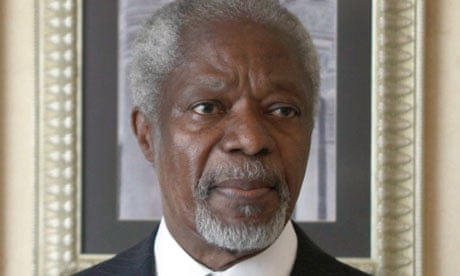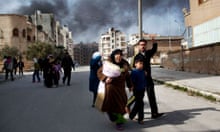Syrian president Bashar al-Assad has told Kofi Annan, the joint UN and Arab League envoy, that there can be no political progress in his country while "terrorist groups" are "spreading chaos".
"Syria is ready to make a success of any honest effort to find a solution for the events it is witnessing," the Syrian Arab news agency quoted Assad as saying. "No political dialogue or political activity can succeed while there are armed terrorist groups operating and spreading chaos and instability."
The rebuff to the peace mission of Annan, the former UN secretary-general, who travelled to Damascus to seek an end to the violence, came as Syrian troops launched a fresh assault on Idlib city, and international divisions over the Syrian crisis multiplied. According to the state news agency, Assad told Annan that, while his country was ready for "any honest effort" to settle almost a year of violence, his precondition was the cessation of attacks by armed opposition groups.
Annan's visit marks a new international push for peace nearly a year after protesters took to the streets to demand Assad's removal from power, inspired by Arab spring uprisings in Tunisia and Egypt. Despite the violence, which according to the UN has claimed more than 7,500 lives, the international community has been extremely reluctant to back military intervention.
Since then, the regime has dispatched snipers, tanks and civilian gunmen to crush dissent. The UN secretary-general Ban Ki-moon told reporters on Friday that Annan's priority in visiting Syria had been to halt all fighting by government forces and rebels – if not simultaneously, then first by government troops, followed by the opposition. Ban said a ceasefire should be quickly followed by inclusive talks to resolve the year-long conflict. Diplomats have said this could prove difficult because opposition leaders have already rejected calls for dialogue, saying only more military aid can stop Assad's deadly crackdown.
The meeting came as opposition activists reported a new government assault on Idlib, in the north west of the country. The Britain-based Syrian Observatory for Human Rights reported that the government was shelling the Idlib region after tanks moved towards the area in recent days.
There was no independent confirmation, but smoke rose into the sky behind some apartment buildings, according to an Associated Press team in the area. Some families were seen fleeing, clutching their belongings. Reinforcements have been pouring into Idlib for days, including dozens of tanks and armoured personnel carriers, activists said. The operation has raised fears that the regime is planning a new, all-out offensive in Idlib like the bloody siege last month that captured a restive part of the city of Homs, further south.
Russian foreign minister Sergey Lavrov sought to defend his country's stance to Arab leaders angered by Moscow's blocking tactics. Last month, just as the Homs offensive was becoming more intense, Russia and China vetoed a draft UN security council resolution that would have supported an Arab League peace plan calling on Assad to hand over powers. That brought accusations that Russia, a longtime Assad ally, was giving the regime diplomatic cover to intensify the crackdown. "We are not protecting any regimes," Lavrov insisted at a heated session of the Arab League in Cairo on Saturday. "We are protecting international law… We are not looking for a special prize or geopolitical interest here."
He said Russia was trying to prevent "interference in domestic affairs of states, not to mention military interference" – something he hinted other Arab countries should be concerned about, given the upheaval of the Arab spring over the past year. "We certainly believe that all outside actors must be extremely careful in addressing problems which your countries are facing," he said.
He said Russia was trying to "promote a peaceful resolution" to Syria's crisis and that the immediate mission now is to halt violence and enable humanitarian assistance to reach those in need. Qatar's prime minister sharply criticised Lavrov's remarks. Speaking after him, he said: "There is systematic genocide by the Syrian government."




Comments (…)
Sign in or create your Guardian account to join the discussion